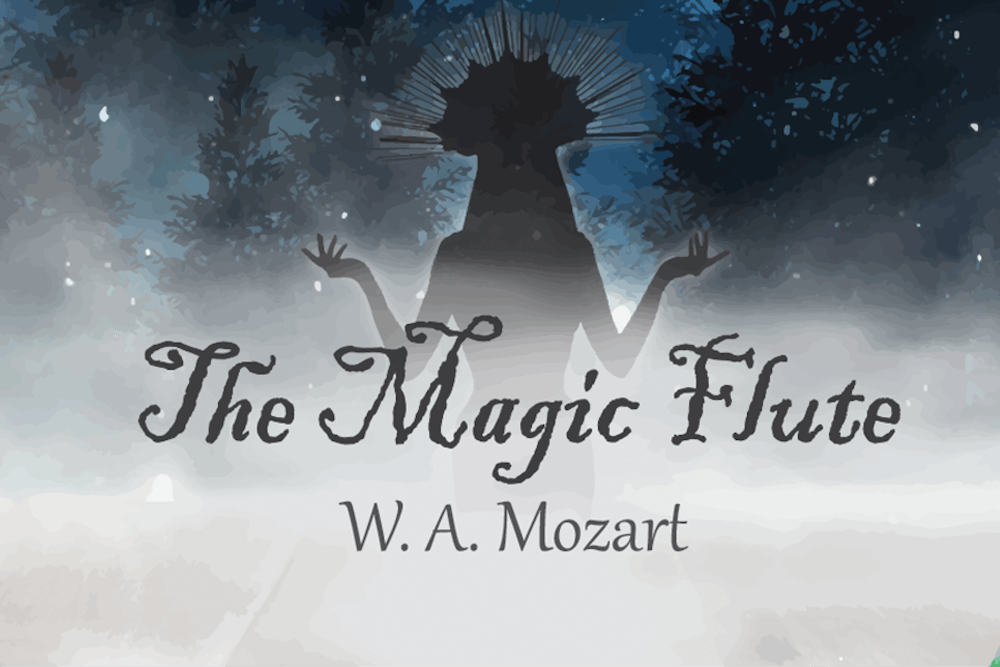The soprano’s voice rang through the theater, spilling over rows of red seats. The opera’s villainous bass responded in low tones, standing above her as she pleaded.
From the audience, director Michael Shell’s voice cut through waves of sound to correct the singers on stage.
“Sarastro, get downstage more! Keep going, keep going — good.”
The moment the act ended and the lights came up, signaling intermission, Shell leapt from his seat and ran to the stage. He moved one man forward and several back before standing back and nodding, every performer’s eyes on him.
When asked what he had changed, his response was simple but symbolic.
“Sarastro’s men had made a group, so I had to split them up,” Shell said. “We needed to see the two warring sides as equals — equal combatants.”
Shell is directing “The Magic Flute,” an opera with music by Mozart with four performances at 7:30 p.m. on Sept. 17, 18, 24 and 25 at IU’s Musical Arts Center.
The opera is in a Singspiel format, meaning it includes both singing and spoken dialogue. While the singing portion remains in German, the spoken dialogue has been translated.
The original story follows Prince Tamino after the Queen of the Night persuaded him to rescue her daughter Pamina from the evil priest Sarastro. Once Tamino and companion Papageno reach Sarastro, they discover that the Queen of the Night is the evil one. The two endure trials ultimately leading to them vanquishing the Queen and proving Tamino worthy of Pamina’s hand.
However, Shell said he had an issue with the original plot.
“There’s a lot about it that’s chauvinistic and racist, and this has been a problematic show for many years,” Shell said. “I don’t think that, as an opera industry, we’ve really focused on it enough.”
IU’s production contains new dialogue, loosely based on the original German, meant to balance the power structures present in the original. While no plot points are changing, Shell said this will help contextualize issues of inequality presented in the production and create a new moral undertone.
“At the end, instead of showing the women who are not allowed in Sarastro’s temple, the path to enlightenment is through unity — it’s through all of us,” Shell said. “The Queen and Sarastro are kind of two sides of the same coin; they represent all parts of all of us.”
Elise Hurwitz said she is playing her dream role as the Queen of the Night. It’s also one of the characters Shell’s revisions changed. In the original production, the Queen is the villain of the story, but Hurwitz’s character is no clean-cut villain.
IU’s production paints Sarastro as the misogynist he is in the original text, she said, while the Queen simply wants her daughter back. She also said her character would not be as evil if the production didn’t take place in such a male-dominated society.
“I like to look at her as not actually being a bad guy at all, but really just being a woman who has no power in a world run by men,” Hurwitz said.
Conductor Arthur Fagen said he feels the production is more accessible to English-speaking viewers because of how the dialogue was adapted and translated. However, because the music is still in German, “The Magic Flute” presents students with a challenge.
Fagen has worked with students on diction, and a language coach was brought in to help with pronunciation, as most of the students are non-fluent.
Fagen has conducted “The Magic Flute,” in the past, but he’s never worked with his current cast before.
“I’ve always done it in professional settings with people who are very experienced, so there was a little bit of a learning curve,” Fagen said.




